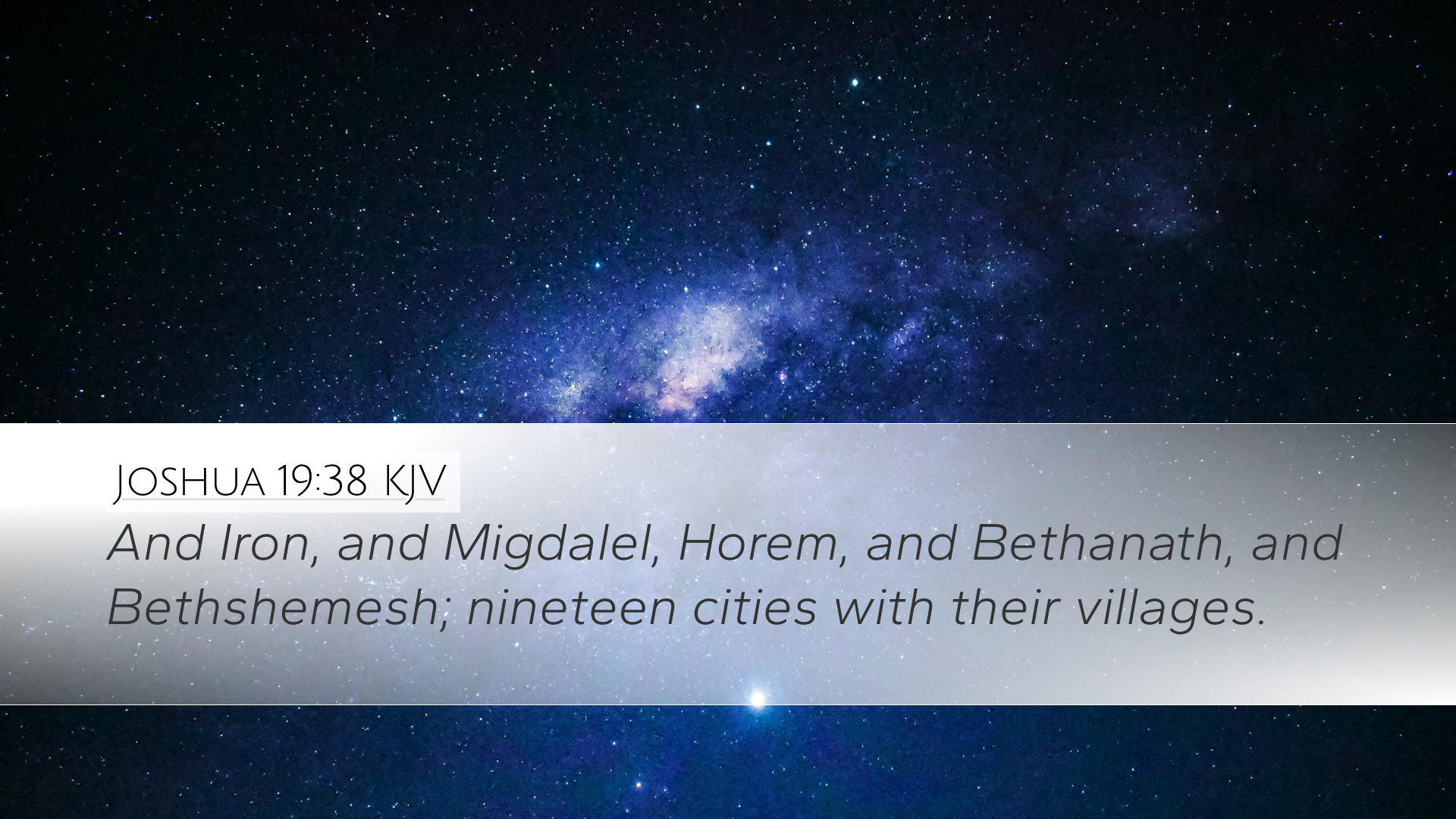Commentary on Joshua 19:38
The verse in consideration, Joshua 19:38, states: “And Iron, and Ebal, and Gebal, and the rest of the cities were counted. This is the inheritance of the children of Zebulun by their families.” This verse is situated in the context of defining the territories allotted to the tribes of Israel following their conquest of Canaan. Below, we explore the nuanced insights drawn from several public domain commentaries relevant to this passage.
Contextual Understanding
To fully grasp the significance of Joshua 19:38, it is imperative to consider the broader narrative of the book of Joshua, which documents Israel's conquest and settlement in Canaan. Joshua, as a military leader and spiritual guide, is instrumental in transitioning the Israelites from wanderers to settled inhabitants of the Promised Land.
Territorial Allotment
Matthew Henry emphasizes that the delineation of land is a testimony to God’s faithfulness in fulfilling His promise to His people. Each tribe receives its inheritance according to divine direction, consolidating their identity as a nation established by God's covenant.
Specific Cities and Their Meaning
In this verse, several key cities are mentioned, each of which deserves attention:
- Iron: A city that, while not extensively detailed in biblical texts, indicates a stronghold that signifies the strength and resilience of the Zebulun tribe.
- Ebal: Traditionally recognized as a site for blessings and curses, Ebal’s mention underscores the dual nature of Israel’s covenant commitment.
- Gebal: Its inclusion may allude to the tribe’s strategic positioning and influence in trade and interaction with neighboring regions.
Theological Implications
Albert Barnes provides an insightful analysis of the theological implications surrounding the inheritance and God’s providence in guiding His people. The land allocation is not merely a matter of physical territory; it embodies divine purpose and fulfillment of promises, which resonates deeply with the themes of ownership and stewardship in the believer's life.
Divine Sovereignty
Barnes argues that the careful recording of these cities illustrates God’s sovereignty over historical events. It serves as a reminder of God’s control over both the spiritual and temporal affairs concerning His creation. By investing in the land, the Israelites are partaking in a larger narrative of redemption and hope.
Spiritual Inheritance
Adam Clarke emphasizes the concept of spiritual inheritance that parallels the physical land granted to the Israelites. Just as the tribes were given tangible property, so too are believers afforded a spiritual inheritance, secured through the life, death, and resurrection of Jesus Christ. This insight encourages a deeper reflection on what it means to possess and cherish one’s spiritual gifts and callings.
Applications for Ministry
This verse holds profound implications for pastors, theologians, and students of the Bible today. The allocation of land to Zebulun provides a framework for understanding how God equips His people for service and mission. Here are a few key applications:
- Faithfulness in Stewardship: Just as the Israelites were called to faithfully inhabit and steward their inheritance, modern believers are challenged to recognize the gifts and opportunities God has placed within their reach.
- God’s Faithfulness: The attention given to the details of the land corresponds to God’s unwavering faithfulness to His promises. Ministry leaders should encourage congregants to expect God's faithfulness in their lives.
- Community and Identity: The division of land among tribes highlights the importance of community. Pastors can foster a sense of belonging and shared purpose within their congregations, drawing on the unity that comes from being part of God’s covenant family.
Conclusion
Joshua 19:38, while a simple enumeration of cities, is rich with theological and practical insights that resonate throughout the ages. By integrating historical context with spiritual significance, we see that every detail in Scripture serves a dual purpose—reflecting God's sovereignty while inviting His people to engage with their inheritance. Through the lens of this verse, believers today are reminded of their identity, calling, and the faithfulness of God who guides them through the complexities of life.


